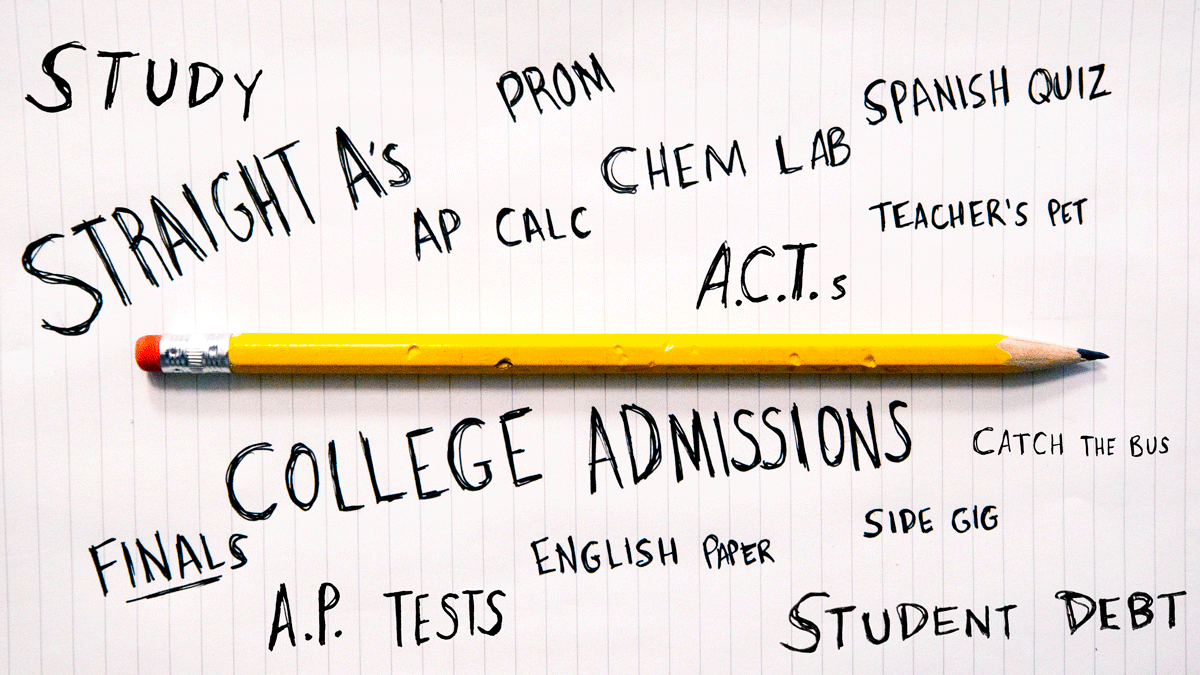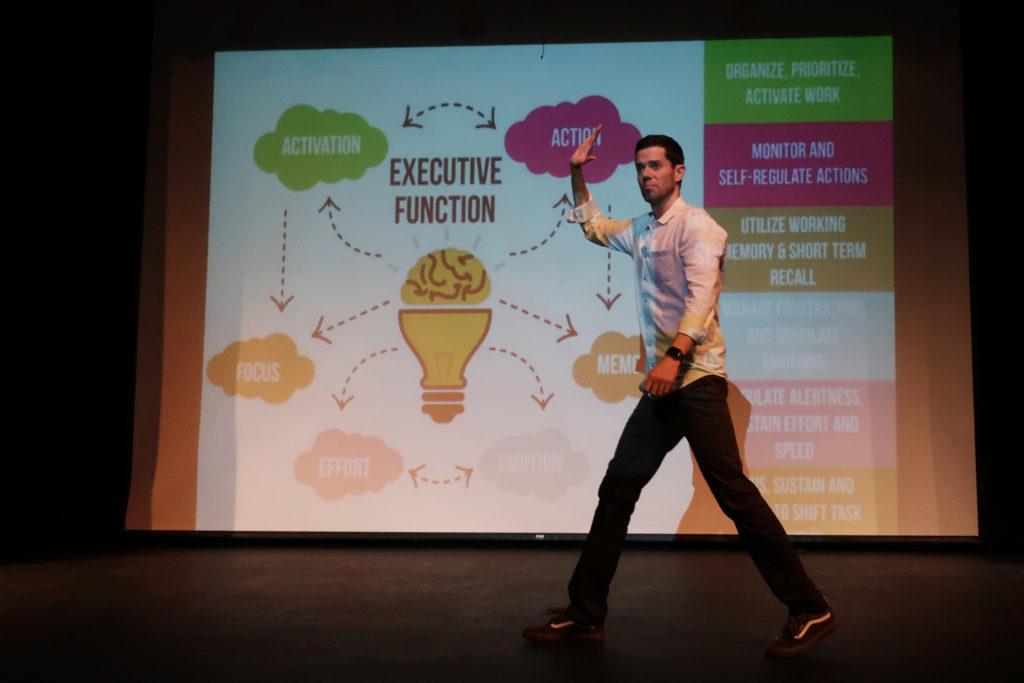
The pressure to excel in school is taking an enormous toll on teenagers.
Academic stress is cited as the number one stressor in teens’ lives in one recent national survey. More than 80 percent of teens said that school was a “somewhat or significant source of stress” in another 2014 American Psychological Association survey. Just under 30 percent reported “extreme stress” during the school year.
Academic stress was also cited as a top reason for anxiety and depression in dozens of CPR News interviews with teens.
For some teens, a focus on college is a big part of an increasingly toxic situation.
Alexandra Robbins, the author of "The Overachievers," writes in The Atlantic that high-stakes testing and accountability in schools comes at a high cost and drastic changes in how teens spend their time. She writes that the pressure to perform to get what students think is an edge in life, and to prioritize who they are on paper over who they are at heart. It’s leading to higher rates of depression, anxiety and suicide.
The pressure can come from parents, or comments from teachers and counselors, but also from the highly competitive culture at large. Then teens start to generate the stress themselves.
“All of your youth has been leading up to that one very moment,” high school student Santiago said. “It's been beaten into us and ingrained in our minds that [four-year] college is the only way to be successful. It’s the only option to succeed in life. And that's it.”

His friend Caden said if it were up to him, he wouldn’t go to a 4-year college.
“Because I'm not the greatest student. But I feel like society is just set up to where like you have to go to college or you're going to fail life," he said.
Around this time of year, high school seniors are in the college application frenzy, while still trying to keep their grades up.
Stephanie O’Neill with the Douglas County Schools crisis team said the exorbitant cost of college puts a lot of pressure to get academic or sports scholarships.
“That puts a ton of pressure on students — ‘Well golly, I got into the school, but how am I going to stay there once I get there and how disappointed my parents would be if I can’t make it there," O'Neill said.
Denver Public School psychologist Susan Stein-Shevell said the students who have set sights on a college option that their family can afford, tend to be happier and less anxious.
Today’s high schools can be high-pressure.
Some teens compulsively check grades online several times a day, each time a teacher enters a grade, to see how it’s changed their grade point average.
The heavy focus on GPA means some students don’t take the classes they’re interested in — instead, they take harder advanced classes that boost their GPA.
High school senior Jana said particularly as a sophomore and junior, she always felt like she wasn’t going to do as well as she needed to do to keep her “A” in a class.
“And my brain would go straight to, ‘I'm not getting into college. If I get a “B” in this one class, I'm not going to get into any university ever. I'm not going to find a job and I’m going to be homeless," Jana said. "Like I've heard so many people just go, ‘I'm going to be homeless.’”
There’s something about the adolescent brain that makes teens particularly vulnerable to high-stakes testing. It’s still developing prospection, the ability to envision oneself in the future, said University of Colorado Boulder clinical psychologist and researcher Roselinde Kaiser.
“If you can't imagine a life after failing this test, then, of course, you're going to be incredibly anxious about the test itself," Kaiser said.
The stressors are more intense now, and there may be cause for even more concern in the next few years.
The entire time this generation has been in K-12 schools has coincided with a shift to high-stakes tests and high accountability on schools and teachers.
The testing explosion ignited with the No Child Left Behind Law of 2001 which required yearly tests with sanctions for schools not meeting those goals, such as school closure or firing staff.
More class time began to be spent on test preparation and practice tests. Teachers’ stress around tests flows down to students. Students, in turn, know their worth as a student is evaluated by those tests.
Now, some are worried about Colorado’s new graduation requirements which will impact the class of 2021. While districts must choose from a menu of 11 options, most of those are test based, requiring students to get a minimum score on a test like the SAT.
“I feel like teens are under extreme pressure,” said Jillian Gleason, a school counselor at Thomas Jefferson High School. She worries the students in the class of 2021 who aren’t meeting the test benchmarks now may think they never will, and give up.
“I feel that pressure may be coming down the pipe here pretty soon even more than it already is."
So kids go all-out from 6:30 a.m. to midnight on extra-curricular activities and volunteer work.
“Right now, I just feel so overwhelmed. I'm a junior and I'm juggling a million different things and I feel like I have to take so many AP classes to define myself as successful,” high school student Maddie said. “And there's all these people who are succeeding so much. There's all this pressure to like to just ...”
“Beat them,” a friend jumps in.
“Beat them, yeah,” Maddie said.
Freshman Kate said she really likes high school, “but it’s a lot.” She competes in multiple sports and she’s already building a resume for her “bucket list” of colleges.
“It's a lot on your plate all the time," she said. "Getting up at 6:30 in the morning is not good when you're getting like four hours of sleep ‘cause you have eight hours of homework when you get home ... it's so fast-paced and it's just so constant.”
If you are in crisis, or are looking for mental health services for you or someone you know, call the Colorado Crisis Services hotline. Call 1-844-493-8255 or text “TALK” to 38255 to speak with a trained counselor or professional. Counselors are also available at walk-in locations or online to chat between 4 p.m. and 12 a.m.
When teens are exhausted, they are more prone to anxiety and depression. One University of Texas Health Science Center study found teens who don’t get enough sleep are four times more likely to develop major depressive disorder.
Another Swedish study of 12,000 teenagers found that lack of sleep and excessive media use were associated with depression and suicidal thoughts.
For some students, the exhaustion is compounded by the need to put food on the table by working a full or part-time job or to help out with caregiving at home. That can leave teens unable to put in the time and effort needed to do well in school.

It’s not just hurting overachievers.
It’s not just the “overachievers” who are experiencing high anxiety, so are the “underachievers.” Nicholas Thompson, a clinical social worker in Boulder and an expert in teen development, said they too started thinking school was too important.
“Their reaction is due to the same thing that is causing the overachiever to go to the same place of high anxiety /depression. It’s the overemphasis,” on high test scores, Thompson said.
“Instead of trying and coming up short, because that’s really hard to do for young people who are trying to build self-esteem, self-efficacy and identity, it’s to say, ‘I’m not going to do that,'" he said.
He said it’s often a reaction to how we talk about school. He said school generally tests two (logical/mathematical and linguistic) of the nine intelligences. That’s what’s emphasized and valued, leaving many students without meaning.
He said the consequences are dire.
“If it's GPA, they lose the love of learning in a school setting,” he said. “If it's about getting an athletic scholarship, they lose the love of athletics and liking to exercise and belonging to a team. If it's about getting enough hours for your IB program, so you checked the box for volunteering, they're losing the love of volunteering when they're 17!”
If we’re killing intrinsic motivation in kids, that’s when they’re not happy.
Kids say it’s time to reexamine a system that normalizes intense stress and 18 hour days. In the coming weeks, CPR News will look closely at how academic stress is impacting teens, hearing from teens in their own voices and following up with relevant research and science.
To keep up on this series, please sign up for our free newsletter.
We want to know more, and we hope you do, too.
CPR News will spend the next few months investigating the factors that have created the ultimate pressure cooker for some teens. We’ll go into their world through audio diaries, interviews, reflection and analysis. Most importantly, we’ll examine what teens, families and schools can do to let some of the pressure loose.
_









